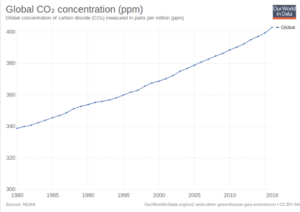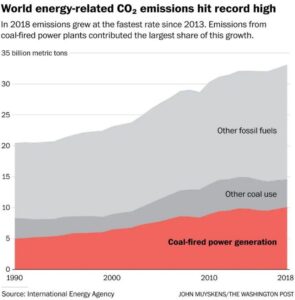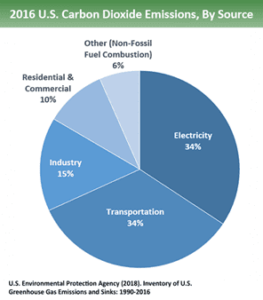The Impending Climate Catastrophe
& How to Combat It
The 2018 update on the 2016 Paris Agreement published by the Intergovernmental Panel on Climate Change (IPCC) confirms that humanity is facing an extremely serious and rapidly accelerating crisis. Time is running out. Yet despite repeated appeals for governments to “declare a state of climate emergency,” no substantial section of the world’s capitalist rulers has shown a commitment to seriously address the problem. There have been lots of gatherings, declarations and paper agreements but very little real progress since 1992 when the UN Framework Convention on Climate Change (UNFCCC) was adopted in Rio de Janeiro (for a partial list see the Environmental and Energy Study Institute website: https://www.eesi.org/policy/international).
The 154 signatories to the initial UNFCCC pledged to stabilise “greenhouse gas concentrations in the atmosphere at a level that would prevent dangerous interference with the climate system.” The 1997 Kyoto Protocol, signed by over 190 countries, called for reducing greenhouse gas to five percent below the 1990 level by 2012. Instead emissions have risen steadily: https://www.theguardian.com/environment/2011/mar/11/kyoto-protocol

The current rate of climate change exceeds previous projections according to the World Meteorological Organisation’s “Statement on the State of the Global Climate in 2018” (see: https://static.rasset.ie/documents/news/2019/03/wmo-report.pdf). The International Energy Agency has come to a similar conclusion regarding carbon-dioxide emissions: https://www.sciencealert.com/coal-plants-are-emitting-more-than-ever-and-we-are-headed-for-disaster.

In “The Uninhabitable Earth” (a book which should be required reading for all those concerned with climate change), David Wallace-Wells explains that even if all the 2016 Paris Agreement targets were met, humanity would still be facing major climatic challenges due to a projected temperature rise of 3°C by the end of this century. The disastrous consequences of global warming are already being experienced by the tens of millions of (mostly poor) people who have been victims of the accelerating tempo of natural disasters, ranging from floods to droughts, hurricanes, typhoons and wild fires.
Climate change & ecological collapse
In addition to greenhouse gas emissions, other major environmental degradations are combining to pose the threat of a generalised ecological collapse. We are currently living through what has been called Earth’s sixth mass extinction event marked by the disappearance of huge numbers of animal and plant species. The resulting reduction in bio-diversity has already produced problems for some agricultural sectors.
(https://www.huffpost.com/entry/nature-destruction-climate-change-world-biodiversity_n_5c49e78ce4b06ba6d3bb2d44)
Deforestation continues apace. The destruction of the jungle in the Amazon basin and the rain forests of Indonesia are best known but as this report shows (http://climate.org/deforestation-and-climate-change/) it is actually a wide-spread phenomenon. The link to climate change is obvious: tropical forests hold more than 210 gigatons of carbon and deforestation is currently estimated to account for as much as 15% of annual greenhouse gas emissions (https://www.saveearth.info/deforestation/).
Water pollution caused by excess phosphorous has reached dangerous levels internationally: https://m.phys.org/news/2018-01-phosphorus-pollution-dangerous-worldwide.html. Another element in the toxic mix pushing the planet in the direction of ecological collapse is the dumping of vast quantities of non-degradable plastics into the seas which negatively impact the life cycles and habitats of marine life already threatened by warming of ocean waters and the resultant de-oxygenation: https://www.earthday.org/2018/04/05/fact-sheet-plastics-in-the-ocean/. While the issue of reducing single-use plastics is currently a hot topic, it seems rather obvious that the best way to tackle the problem would be to end the production of all non-recyclable plastics.
Capitalism can’t be fixed; production for profit must be eliminated
A growing number of people are becoming alarmed by the situation and pushing for immediate action to stave off the looming danger of ecological collapse. The first step in solving any problem is obviously to identify the factors that have created it. It is very clear that the danger caused by greenhouse gas emissions is not caused by bad choices by individual consumers—it is the result of the profit priorities that drive the entire system of corporate agricultural and industrial production, marketing and waste management.
While there have been some attempts to curb the worst excesses by pressuring the most egregious offenders to cut their emissions, introducing carbon taxes and issuing “cap and trade” licenses to polluters, these measures have had negligible impact. Despite what governments and corporate media would have us believe with their incessant talk about “individual responsibility,” the primary source of greenhouse gases is not atomised consumers but the processes of production – both industrial and agricultural.

Successfully addressing the climate emergency requires drastic measures that must be undertaken on a global scale including, but not limited to, a crash programme to insulate existing housing and commercial structures while mandating that all future construction must meet the highest quality insulation standard. A related measure would be to carry out a rapid transition from gas and oil-based heating systems to geo-thermal, solar and other forms of renewable energy. There must also be a large-scale programme of planting of indigenous species of trees and other vegetation to expand the plant-based carbon sink while increasing the range of environments within which threatened species can be re-established.
A critical component of this programme would be the creation of a dense network of free (or nominally priced), effective, convenient public transportation (powered by electricity rather than fossil fuel) in order to dramatically reduce dependence on private automobiles. In the meantime we reject the “carbon tax” strategy because it has little real impact on the problem and chiefly serves to antagonise ordinary citizens who depend on their cars to get around—raising fuel costs inevitably leads them to identify with the oil and gas lobby. Alongside a vast expansion of high-speed electrified rail, developing alternatives to fossil fuel powered air travel must also be a high priority.
While the response of the dominant sections of global capital to the growing crisis has combined hypocrisy and indifference, an influential section of the U.S. ruling class, represented by the odious Koch brothers, has countered by funding pseudo-scientific “research” to refute the idea that climate change is actually underway. U.S. President Trump, who not surprisingly is part of this cohort, idiotically denounces attempts to reduce global warming as “bad for business,” and characterises proposals for investments to ensure that humanity has a future as “unrealistic” and “economically unviable.” Only slightly less short-sighted are those elements in the ruling class which acknowledge the problem but concentrate on finding funding for a few minor tweaks like building seawalls to protect low-lying areas of New York and the U.S. capital in Washington D.C. The New Orleans’ levees built in the wake of the devastation of Hurricane Katrina in 2005 took a decade to construct and cost an estimated $14 billion—but the U.S. Army Corps of Engineers now admit they “may not be able to keep up with climate change and rising sea levels” because “It’s happening a little bit faster than our projections in 2007” (https://weather.com/news/news/2019-04-15-new-orleans-levees-rebuilt-no-protection).
Most of the studies produced by deep state thinktanks and intelligence agencies of the major powers are far less complacent—they project a future marked by mass population transfers, social upheavals and military conflicts over increasingly scarce resources resulting from famines, floods and other calamities produced by climate change. This has yet to make much impression on big business. Between 2016 and 2018 thirty-three of the world’s largest banks boosted financing for fossil fuel production to US$1.9 trillion (https://www.ran.org/bankingonclimatechange2019/). While publicising relatively trivial investments in the development of “green energy,” the major energy corporations are planning to increase fossil fuel extraction over the next few decades.
“According to ExxonMobil, global oil and gas demand will rise by 13% by 2030. All of the majors, not just ExxonMobil, are expected to expand their output. Far from mothballing all their gasfields and gushers, the industry is investing in upstream projects from Texan shale to high-tech deep-water wells.”
—https://www.economist.com/leaders/2019/02/09/the-truth-about-big-oil-and-climate-change………………………………………………….
“Far from abandoning them, the shareholdings of the world’s 20 largest institutional investors in big oil companies climbed from 24% in 2014 to 27% in 2017, according to the International Energy Agency.”
…
“While oil companies plan to grow, trends in cleaner energy are moving in the wrong direction. Investments in renewables fell as a share of the total in 2017 for the first time in three years, as spending on oil and gas climbed.”
—https://www.economist.com/briefing/2019/02/09/exxonmobil-gambles-on-growth
The big oil corporations and the financial “rulers of the universe” are unable to respond intelligently to the looming threat of ecological collapse because they are captive to the “logic” of short-term profit maximisation. Capitalism is a global system driven by competition for resources and market share in which those with the lowest costs bankrupt their rivals. Given that fossil fuels are currently the cheapest form of energy, and that energy is a critical input in production, the pursuit of competitive advantage between individual corporations (as well as rival nations), necessarily impels each producer to use the cheapest possible inputs and minimise investment in processing toxic bi-products. Firms which spend time and money on socially beneficial activities that make no positive impact on the “bottom line” put themselves at a huge disadvantage in the “free market.”
Capitalist economic theory starts from the premise that each corporation has one central responsibility: maximising profits. Things like increasing human suffering or contributing to rendering the world uninhabitable are dismissed as “externalities” which lie outside the mandate of corporate decision makers. Eventually of course the situation will become so dire that even the dimmest billionaires will come to realise that a course correction is necessary. But by that time it will almost certainly be too late.
Capitalism is the problem—Socialism is the solution
Many of those genuinely concerned about this disastrous predicament cling to the hope that somehow the existing governmental and social structures can be pressured into acting in humanity’s long-term interests. This, unfortunately, is a debilitating illusion. Staving off ecological collapse requires that the mass of humanity takes control of the natural resources and the machinery of production that human life depends upon. This means expropriating the corporations and the billionaires. Only by making the essential resources required for the survival of humanity the common property of the working people of the world, can coordinated international economic planning on the scale necessary to address the crisis be undertaken.
The potential ecological catastrophe confronting us today is an entirely logical bi-product of the capitalist social system of production for profit, rather than use. This system developed over several centuries. For much of that time capitalist competition was a dynamic and historically progressive factor, but for the last century—roughly since the outbreak of World War One—it has become an impediment to human development and even survival. It must be transcended through a wholesale, global reorganisation of production and the creation of a collectivised, socialist economic order. The central agency of such a revolutionary transformation can only be a politically conscious working class—i.e., the people who operate the global systems of production, distribution, transportation, communication and perform every other essential social function. This will require going beyond the kind of coordinated action taken in the student strikes and Extinction Rebellion disruption stunts to take more significant direct action, including industrial actions, occupations, general strikes and other forms of mass popular mobilisation which can shake the rule of capital and begin to lay the basis for its overthrow.
The interests of working people around the world, unlike those of their capitalist masters, are fundamentally identical. This common interest provides the objective basis for a rational, global world economic order in which human need, and the protection of the natural biosphere, will determine social priorities.
The capitalists will of course stop at nothing to maintain their rule. A successful movement to depose them must therefore be broadly based among the globe’s billions of working people and organised in such a fashion that it can effectively counterattack the capitalists’ repressive state machinery (police and military) and their fascist auxiliaries. The leadership of such a movement must be composed of the most dedicated and selfless militants organised in a disciplined revolutionary workers’ organisation capable of undertaking the seizure of state power, and thereby beginning to lay the basis for a new, egalitarian social and economic order that goes beyond the limitations of capitalist parliamentary democracy. The political supremacy of working people would be expressed through a network of decision-making bodies integrated on local, regional, national and international levels. Such bodies would be composed of representative delegates paid no more than the average wage and recallable at any time by those who elected them.
No more should so many of the decisions that affect our lives take place behind the façade of “commercial secrecy” in the board rooms of competing corporations. No more government for, by and of the rich. No more unplanned growth and planned obsolescence. No more squandering valuable resources on marketing, packaging and advertising. No more hunger, no more war, no more homophobia, racism or sexism. What is produced, how it is produced and how it is distributed are decisions that must be balanced against their impact on the environment and evaluated on their contribution to meeting human need. This is essential not only to combat the looming threat of ecological collapse but will make it possible to establish a social order which can guarantee peace, plenty and freedom for the world’s working people.

